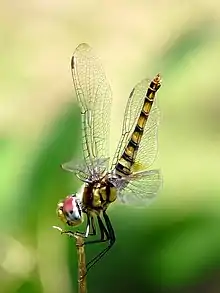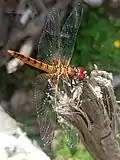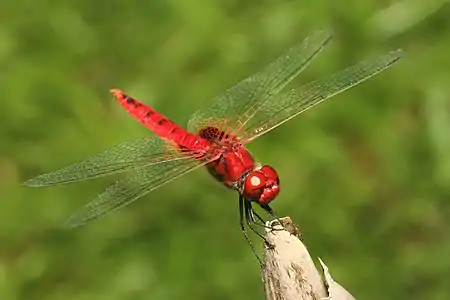Urothemis signata
Urothemis signata,[2] the greater crimson glider,[3] is a species of dragonfly in the family Libellulidae. It is widespread in many Asian countries. A number of subspecies are recognized for this species.[4][1]
| Urothemis signata | |
|---|---|
 | |
| Male U. s. signata | |
 | |
| Female U. s. signata | |
| Scientific classification | |
| Domain: | Eukaryota |
| Kingdom: | Animalia |
| Phylum: | Arthropoda |
| Class: | Insecta |
| Order: | Odonata |
| Infraorder: | Anisoptera |
| Family: | Libellulidae |
| Genus: | Urothemis |
| Species: | U. signata |
| Binomial name | |
| Urothemis signata (Rambur, 1842) | |
| Synonyms | |
|
Libellula signata Rambur, 1842 | |
Subspecies
There are four subspecies are recognized.
- Urothemis signata aliena Selys, 1878 - Australia and New Guinea
- Urothemis signata insignata (Selys, 1872) - Sundaland
- Urothemis signata signata (Rambur 1842) - India, Sri Lanka, Myanmar, China and Indochina[5]
- Urothemis signata yiei Asahina, 1972 - Taiwan
_male.jpg.webp)
Description and habitat
It is a medium-sized dragonfly with red eyes. thorax and abdomen. Its wings are transparent with a amber colored spot surrounded by a dark-brown patch in the base of hind-wings. Its abdomen is blood-red, with some black marking on the dorsum of segments 8 and 9. Female is similar to the male; but yellowish in color. The black spots on the dorsum is repeated on segments 3 to 7. Juvenile and sub-adult males also have these marks.[6]
This species breeds in ponds and slow flowing rivers, typically in lowland areas. The males often found perch on exposed twigs. This species has managed to colonise urban water bodies and park ponds.[7][6][8][3][9]
Image gallery
 Urothemis signata at Vechoochira, Kerala, India.
Urothemis signata at Vechoochira, Kerala, India. Urothemis signata from India
Urothemis signata from India
References
- Dow, R.A. (2010). "Urothemis signata". IUCN Red List of Threatened Species. 2010: e.T165562A6063342. doi:10.2305/IUCN.UK.2010-4.RLTS.T165562A6063342.en. Retrieved 20 November 2021.
- Paulson, D.; Schorr, M.; Abbott, J.; Bota-Sierra, C.; Deliry, C.; Dijkstra, K.-D.; Lozano, F. (2023). "World Odonata List". OdonataCentral, University of Alabama. Retrieved 14 Mar 2023.
- "Urothemis signata Rambur, 1842". India Biodiversity Portal. Retrieved 2017-02-18.
- Odonata: Catalogue of the Odonata of the World. Tol J. van , 2008-08-01
- K.A., Subramanian; K.G., Emiliyamma; R., Babu; C., Radhakrishnan; S.S., Talmale (2018). Atlas of Odonata (Insecta) of the Western Ghats, India. Zoological Survey of India. pp. 397–398. ISBN 9788181714954.
- C FC Lt. Fraser (1936). The Fauna of British India, including Ceylon and Burma, Odonata Vol. III. Red Lion Court, Fleet Street, London: Taylor and Francis. pp. 442–444.
- Subramanian, K. A. (2005). Dragonflies and Damselflies of Peninsular India (PDF).
- C FC Lt. Fraser (1924). A Survey of the Odonate (Dragonfly) Fauna of Western India and Descriptions of Thirty New Species (PDF). p. 445.
- "Urothemis signata Rambur, 1842". Odonata of India, v. 1.00. Indian Foundation for Butterflies. Retrieved 2017-02-18.
External links
 Data related to Urothemis signata at Wikispecies
Data related to Urothemis signata at Wikispecies Media related to Urothemis signata at Wikimedia Commons
Media related to Urothemis signata at Wikimedia Commons
